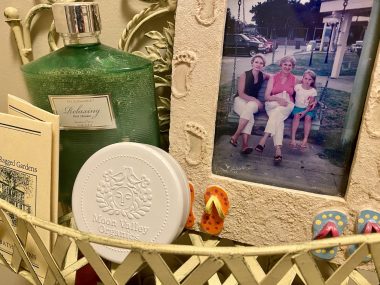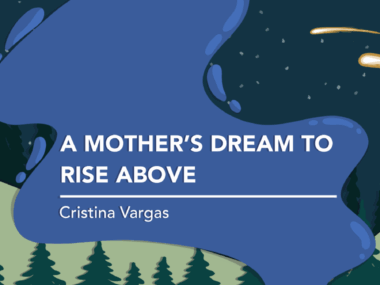Beach Memories Remind Me of Dreams, Regrets, and Second Chances
For this columnist, every day is a second chance to live more like her late sister
Written by |

My husband and I are renovating our primary bathroom and have been using the Jack-and-Jill bathroom down the hall since early December.
The Jack-and-Jill bathroom’s scant coastal decor features a small shelf filled with sweet-smelling soaps, bath beads, and a beach-inspired picture frame. Behind the glass, three women sit on a weathered swing. A soft breeze, born over the slow-moving waters of North Carolina’s Cape Fear River, ruffles their hair. The two short-haired look-alikes are my grandmother and mother. The smallest of the three — my sister, Taylor — is so young that her flip-flops don’t touch the ground. Taylor has Batten disease, but nobody knows. The year is 2005.
Summers of dreams
I am not in the photo because I was behind the camera. I was 23 that summer, still fresh out of college and engaged to be married.
I spent much of my childhood on the North Carolina coast, and Southport’s whimsical Waterfront Park held a special place in my heart. After all, my grandmother taught me to write on those swings: With a grease-dotted paper bag of hush puppies and sweet iced teas propped between us, we filled spiral notebooks with dreamy couplets and haikus and stories we spun on the spot. I first dreamed of becoming a writer before I ever attended school; those enduring afternoons with my grandmother made me believe I could do it.

A photo of Laura’s mother, grandmother, and sister sits on a small shelf in her Jack-and-Jill bathroom. (Photo by Laura King Edwards)
But the visits to Southport came to a grinding halt the year Taylor was born. My grandparents fell on tough times and sold the beach house they’d built on nearby Oak Island. I traded my sandy beach tote for a soccer duffel that smelled of grass and sweat. Family vacations became less frequent.
Still, Taylor and I were closer than you might imagine for siblings with a 16-year age gap, even after I spent four years away from home for college. That girls’ trip to the beach in the summer of 2005 was supposed to be a once-in-a-lifetime experience and, with my wedding on the horizon, maybe the last time my sister, mother, grandmother, and I would travel together.
A lifetime of regret
The trip was memorable, all right, but for all the wrong reasons. I had a near-constant migraine — the heat, humidity, and Taylor’s constant needling created the perfect storm for someone already prone to brain pain. That week at the beach is the only time I remember ever truly fighting with my sister. Indeed, in the photo I snapped of the swing, Taylor is glaring at me (the fact that she’s still gorgeous is a testament to her natural beauty, even at 6).
Have you ever wished you could relive even a single day of your past, armed with the knowledge you have now? I try not to live under the weight of regret, and yet I regret treating my sister with such disdain. Had I known she was already terminally ill, would I have done things differently?
But, of course, I had no reason to think Taylor was suffering from something as cruel as Batten disease. Doctors are taught to think of horses, not zebras, when they hear hoofbeats, meaning they should first consider a more common (and more likely) diagnosis. Compared with many families, mine didn’t have to wait long for the correct diagnosis. And yet, we still received two — nonverbal learning disorder and retinitis pigmentosa — before I Googled neuronal ceroid lipofuscinosis on one of the worst days of my life.
Second chances
That once-in-a-lifetime girls’ beach week was, indeed, a one-time thing. I never got a second chance to do it the right way.
But I’ve been blessed with many other second chances, which is far more than I can say for my sister. You could even say I was born lucky, since I was born to CLN1 disease carriers but didn’t get the disease. And while I didn’t save Taylor, as I once vowed to do, I consider every day I receive to be a second chance.
A chance, knowing what I know now, to try living my life just the way she lived hers.
Note: Batten Disease News is strictly a news and information website about the disease. It does not provide medical advice, diagnosis, or treatment. This content is not intended to be a substitute for professional medical advice, diagnosis, or treatment. Always seek the advice of your physician or other qualified health provider with any questions you may have regarding a medical condition. Never disregard professional medical advice or delay in seeking it because of something you have read on this website. The opinions expressed in this column are not those of Batten Disease News or its parent company, Bionews, and are intended to spark discussion about issues pertaining to Batten disease.






Leave a comment
Fill in the required fields to post. Your email address will not be published.